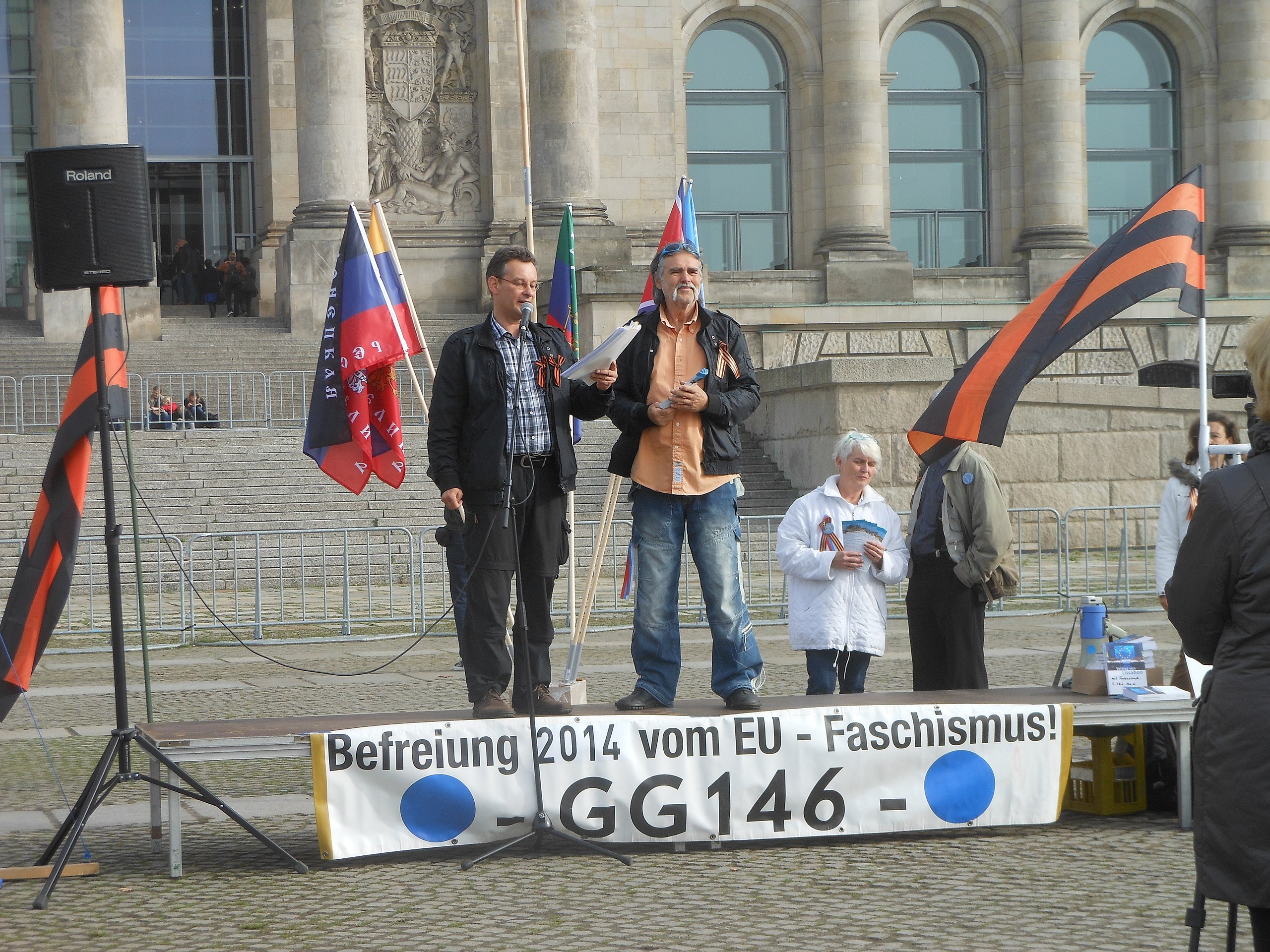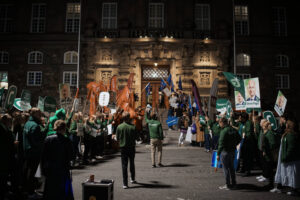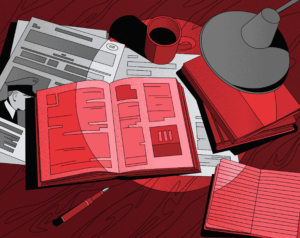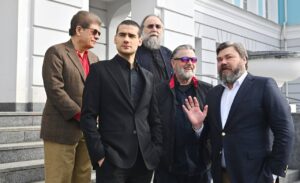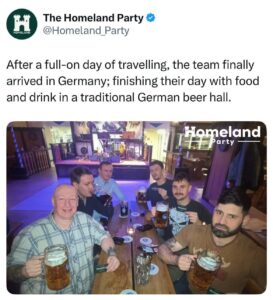The Reichsbürgers (“Citizens of the Reich”), also known as Reichsdeutsche or Reichsideologen, are a heterogeneous far-right movement in Germany. Reichsbürgers believe that the Deutsches Reich (German Empire) remains the legal status of present-day Germany. In their view, the elected government is illegal under international and constitutional law. They frequently use pseudo-legal arguments, often referring to historical treaties or statements by individual politicians to support their claims. They believe that the German Reich continues to exist and consider the Federal Republic of Germany to be under Allied occupation. According to a representative survey conducted by the conservative Konrad Adenauer Foundation in 2021-2022, around 5% of Germans agree with the statement that Germany is still governed by occupying powers.
Although the Reichsbürger movement emerged in the 1980s, it only began to gain wider attention from the state, civil society, and Antifa in the 2010s due to acts of violence—despite the fact that Antifa had been monitoring specific individuals and groups associated with the ideology for some time.
Ideology
Some groups have established their own provisional Reichsregierung (“Reich government”), which they consider to be the actual government of Germany. Others regard the former German imperial noble family, the Hohenzollerns, as the country’s legitimate rulers. Their rejection of existing state structures underlies their opposition to parliamentary democracy and democratically elected governments. Most of these groups also refuse to recognize Germany’s current borders with Poland, Denmark, and France. They claim a German Reich within the borders of either the German Empire or those of 1937.
Many Reichsbürger groups publish pseudo-documents, such as Reichsführerscheine (“Reich driver’s licenses”). Some Reichsbürger members make a living by selling these pseudo-documents or offering seminars to their supporters. The Reichsbürgers are predominantly far-right, antidemocratic, antisemitic, anti-American, and adherents of conspiracy theories. The turn to Reichsbürger ideology is often an adherent’s response to personal or societal crises. Meanwhile, leaders of the movement exploit political crises, such as the euro crisis or the Russian-Ukrainian war, to further spread their ideology.
In 2021, the domestic intelligence service, the Verfassungsschutz (“Office for the Protection of the Constitution”), estimated that there were 25,000 Reichsbürger in Germany. The Verfassungsschutz classifies only 5% of Reichsbürgers as members of the far-right. However, critics argue that the entire movement is far-right due to its underlying ideology. The professional association of bailiffs, who often come into conflict with Reichsbürgers, estimated the number at 40,000 in 2016. The movement experienced significant growth during the coronavirus pandemic, as Reichsbürger participated in protests alongside pandemic deniers. During this time, Reichsbürger ideology often merged with QAnon conspiracy theories. Closely associated with the Reichsbürger movement are the so-called Selbstverwalter (“self-administrators”), who have been on the rise since the 2010s. The Selbstverwalter claim that they can secede from the Federal Republic of Germany and its legal system through unilateral declarations of independence.
Reichsbürger groups
The Reichsbürgers are organized into various groups or operate as individuals. Despite this diversity, they can still be considered part of a broader movement with a shared core ideology. The Reichsbürger movement is fragmented by internal competition and power struggles, but demonstrations involving up to 1,000 participants have been occurring since 2023.
According to the Verfassungsschutz, there were 30 Reichsbürger organizations in Germany in 2024. Some of the most notable groups include or previously included: Deutsches Kolleg / Völkische Reichsbewegung, Freistaat Preußen, Exilregierung Deutsches Reich, Volks-Bundesrath und Volks-Reichstag / Deutsche Gesundheitskasse, Interimpartei Deutschland (IPD), Germaniten / Staat Germanitien / Volksgruppe Ringvorsorge / Justiz-Opfer-Hilfe, Staatenlos.info, Fürstentum Germania, Europäische Aktion, Deutsche Polizei Hilfswerk (DPHW), Republik Freies Deutschland (RFD), Königreich Deutschland (KRD), Freie Wählergemeinschaft Einiges Deutschland, Geeinte deutsche Völker und Stämme, Patriotische Union, and S.H.A.E.F.
Some groups within the Reichsbürger movement have specific ideologies, such as the Reichsbürger group Staatenlos.info. This group, drawing on various conspiracy theories, claims that the Third Reich continues to exist and that Germany must be legally de-Nazified. Consequently, followers of this group ironically refer to themselves as anti-fascists. Many Reichsbürger use the black, white, and red flag of the German Reich as a symbol. Neo-Nazis also use this flag, as it serves as a substitute for the swastika flag due to the similar color scheme.
The case of Königreich Deutschland

Some Reichsbürger groups function like political sects, with their leaders assuming the role of charismatic figures akin to religious gurus. One prominent example is the Königreich Deutschland (KRD, “Kingdom of Germany”) group. With an estimated 6,000 members and followers, it is the largest Reichsbürger group.
The KRD was founded in Wittenberg in September 2012 by Peter Fitzek, an esoteric bookstore owner and author of esoteric literature. Fitzek declared himself “King of Germany” and has since attempted to establish a parallel state. His efforts have included founding pseudo-banks and introducing an alternative currency. Additionally, Fitzek purchased two castles in Saxony, where he has been working to develop his own settlements.
Dangers posed by the Reichsbürger
The German state began monitoring the Reichsbürger movement nationwide through its secret service, the Verfassungsschutz, in November 2016. This heightened scrutiny followed a police operation on October 19, 2016, in Georgensgmünd, where a special task force encountered a Reichsbürger, leading to an exchange of gunfire. Three police officers were injured, and one died from his injuries.
Since the killing of the SEK officer, the Reichsbürger movement has been classified as an “anti-state movement” and is under the surveillance of the Verfassungsschutz. Members frequently face legal issues due to tax evasion and refusal to pay fines and fees, leading to foreclosures and conflicts with bailiffs. In November 2013, for instance, members of the Reichsbürger group Deutsches Polizeihilfswerk took a bailiff hostage.
Some Reichsbürger groups have even issued death threats against civil servants or rival factions. The movement also saw increased radicalization during the coronavirus pandemic. On August 29, 2020, over 400 people attempted to storm the Reichstag building, the seat of the German parliament, after a protest against coronavirus measures. Some participants carried flags of the German Reich, but the police prevented them from entering the building.
In mid-April 2022, it was revealed that members of a nationwide Telegram chat group of Reichsbürger and pandemic deniers had planned explosive attacks and the kidnapping of Health Minister Karl Lauterbach. This led to the search of 21 properties across Rhineland-Palatinate, Baden-Württemberg, Brandenburg, Bavaria, Lower Saxony, North Rhine-Westphalia, Saxony, Schleswig-Holstein, and Thuringia on April 13, 2022. Four men were arrested in connection with these plans. They has been on trial since May 2023.
The case of Prinz Reuß and his followers
In 2021, the “Patriotic Union” group of citizens of the Reich was secretly formed around the nobleman Heinrich XIII Prince Reuß. This group is said to have planned to overthrow the German government, which they considered to be a puppet of a “Deep State.” The group’s ideology comprises a mix of Reichsbürger thinking, QAnon cult, and esotericism. Its members also believed in the abduction of children by satanic elites in order to abuse them or extract adrenochrome from them as a rejuvenating agent.
On the morning of December 7, 2022, house searches were conducted at 150 properties across the German federal states of Baden-Württemberg, Berlin, Brandenburg, Hessen, Nordrhein-Westfalen, Rheinland-Pfalz, Saarland, Thüringen, and Niedersachsen, as well as in Kitzbühel (Austria) and Perugia (Italy). This operation led to the arrest of 25 individuals, including 22 suspected members and three suspected supporters, with an additional 27 suspects also arrested. A total of 3,000 police officers were involved in the searches. They seized 93 illegal weapons and gold bars valued at six million euros.
The operation targeted the Patriotische Union (“Patriotic Union”) or Der Rat (“The Council”) group, which was founded by 2021, and the military group Neue Deutsche Armee (“New German Army”), reportedly consisting of 50 people. These groups are said to have planned to overthrow the government and replace it with an authoritarian regime. According to the public prosecutor’s office, the group’s goal was to overthrow “the existing state order in Germany and replacing it with its own form of government that had already been worked out in outline. The members of the group are aware that this plan can only be realized through the use of military means and violence against state representatives. This also includes the commission of homicides” (press release by the Federal Public Prosecutor General, November 7, 2022).
According to the public prosecutor’s office, the group made contact with Russia in pursuit of their goals: “The accused Heinrich XIII P. R. has also already made contact with representatives of the Russian Federation in Germany. However, according to the investigations so far, there are no indications that the contact persons have reacted positively to his request” (Press release by the Federal Public Prosecutor General, November 7, 2022).
The group involved several former soldiers, including members of the German army’s special forces unit Kommando Spezialkräfte (KSK). It also included Berlin judge Birgit Malsack-Winkemann, a former AfD member of the Bundestag.
The first trial began in Stuttgart on April 29, 2024, followed by a second trial on May 21, 2024, in Frankfurt am Main, against a group of so-called Reichsbürger led by the nobleman Heinrich XIII Prince Reuß. The group is accused of planning an armed coup. The 26 defendants are being tried in courts across Frankfurt am Main, Stuttgart, and Munich, and these legal proceedings are expected to take several years.
Similar movements in other countries
Like the German Reichsbürgers, there are right-wing state deniers in Switzerland and Austria. Acts of violence have occurred in these countries as well. For instance, on October 29, 2017, in Stiwoll near Graz (Austria), the state denier and neo-Nazi Friedrich Felzmann. shot two neighbors with a rifle during an argument, seriously injuring another. He has been wanted ever since and is number 2 on the list of “Austria’s most wanted persons.”
In the United States, the extreme right-wing Sovereign Citizen Movement resembles the Reichsbürger movement in Germany. Members of this movement do not recognize the authority of the American federal government, engage in pseudo-legal arguments, and are ideologically driven by conspiracy theories.
Russia also has a similar movement called the “Movement of Citizens of the USSR” or “Union of Slavic Forces of Russia.” It was founded in 2010 and does not recognize the modern Russian Federation. It continues to use Soviet documents and issues its own fake documents. Even though the role model is a socialist state, the movement is clearly far-right.
Literature used (German)
- Andreas Speit (Hrsg.): Reichsbürger. Die unterschätzte Gefahr. Ch. Links Verlag, Berlin 2017
- Jan Rathje: „Wir sind wieder da“. Die „Reichsbürger“: Überzeugungen, Gefahren, Handlungsstrategien. Gefördert durch das Bundesministerium des Innern im Rahmen des Bundesprogramms „Zusammenhalt durch Teilhabe“. Amadeu Antonio Stiftung, Berlin 2014
- Jan Rathje: Reichsbürger, Selbstverwalter und Souveränisten. Vom Wahn des bedrohten Deutschen, 2017
